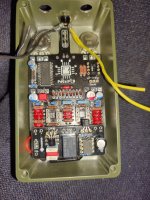Stickman393
Well-known member
Decided to look into these cause I keep seeing them in commercial pedals...
As a replacement for aluminum electrolytics: PROS: SUPER low ESR, much longer shelf-life than similar electros. Solid electrolyte, no potential for drying out. Good at handling ripple, Relatively compact too.
Cons...potentially more expensive (though Kemet's are pretty reasonable through mouser), much more prone to (dc) leakage, higher voltage ratings and specific values can be difficult to track down in through-hole format.
Seems like a decent option for power supply filtering applications, maybe not so much for coupling. I decided to try out a few in my HAARP rebuild. Shoot, they look good at least.
Discuss. Anybody out there reach for these?
Added bonus for y'all holistic pedal builders, they're "Organic". So...you know...they're non-gmo. Or something. Add it to a blurb, someone'll believe it.
As a replacement for aluminum electrolytics: PROS: SUPER low ESR, much longer shelf-life than similar electros. Solid electrolyte, no potential for drying out. Good at handling ripple, Relatively compact too.
Cons...potentially more expensive (though Kemet's are pretty reasonable through mouser), much more prone to (dc) leakage, higher voltage ratings and specific values can be difficult to track down in through-hole format.
Seems like a decent option for power supply filtering applications, maybe not so much for coupling. I decided to try out a few in my HAARP rebuild. Shoot, they look good at least.
Discuss. Anybody out there reach for these?
Added bonus for y'all holistic pedal builders, they're "Organic". So...you know...they're non-gmo. Or something. Add it to a blurb, someone'll believe it.



